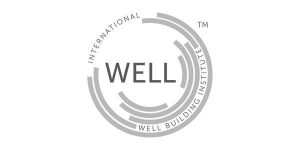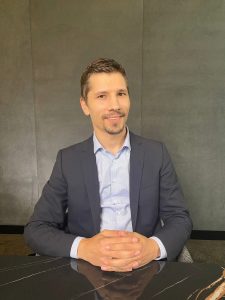
HPBS, JLL, AECOM and the Russian Green Building Council
Experts on WELL:
Snezana Stojkovic

- WELL AP
- AECOM Russia – Head of Building Engineering
Ilya Zavaleev

- Green Engineer
- CEOof the HPBS company
WELL Certification
People change, develop and think about the conditions in which they live, work, raise their children.
The seminar was attended by 60 people. Someone came to understand what WELL certification gives for buildings, someone to learn about its features, and someone has already started building a building according to WELL and is testing their knowledge and capabilities.
WELL Building Standard Certification
The international system of certification of buildings of the highest level. Focuses exclusively on human health and well-being.
The goal is a healthy person.
Developed by the International WELL Building Institute under the leadership of Richard Fedrizzi, Chairman and CEO – Launched in 2014. (Developed for 6 years).
WELL certification is a tool for professionals: architects, designers, builders, owners, developers, and available for all buildings and premises.
New buildings:
- Offices
Trade centers
Housing
Educational institutions
Restaurants
Existing buildings:
- Interiors
- Shell and Cor
- Whole districts
In order to meet the requirements of the WELL standard, the premises must undergo a process that includes on-site evaluation and performance testing conducted by a third party.
The WELL certification process includes 4 main steps:
- Registration – filling out the form and paying for registration
- Application – provision of WELL documentation and payment of verification fees
- Verification – the application is verified by GBCI:
– Preliminary check
– Final check on clarifications
– Appeal, if necessary
- Certification – Obtaining a certification solution
Sections and criteria:
AIR
- No smoking inside and outside
- Ventilation
- Protection from internal pollution in construction
- Air purity
- Advanced ventilation
- Openable windows
- Environment monitoring
- Facade and infiltration of substances
- Gorenje processes
- Separation of dirty processes
- Filters
- VOC control
- Microbe and mold control
WATER
- Basic water quality
- Water pollution
- Legionellosis
- Improved water quality
- Regular water quality control
- Promotion of drinking water
- Moisture management
- Convenient plumbing
NOURISHMENT
- Fruits and vegetables
- Caloric content and composition of food
- Limits on substances in food
- Food advertising
- Artificial additives
- Serving size
- Food Education
- Conscious nutrition
- Special diets
- Semi-finished products
- Responsible sources of products
- Growing food
- Location and food
LIGHT
- Access to light and education
- Lighting design
- Circadian light
- Glare and brightness
- Access to natural light
- Visual balance
- Artificial light quality
- Lighting control
MOVEMENT
- Active building and society
- Ergonomics
- Movement inside the building
- Active movement on the street
- Plot planning
- Training
- Active workplaces
- A place for sports
- Active exterior
- Improved ergonomics
- Promotion of physical activity
- Self-diagnosis
MIND
- Promoting Mental Health
- Access to nature
- Mental Health Support
- Mental Health Education
- Stress Management
- Recovery Options
- Recovery spaces
- Recovery programs
- Improved access to nature
- Concentration support
- Sleep support
- Business trips
- Tobacco prevention
- Alcohol and drugs
- Opioids
THERMAL COMFORT
- Increased thermal comfort
- Temperature zoning
- Individual climate control
- Radial thermal comfort
- Microclimate monitoring
- Humidity control
SOUND
- Acoustic plan
- Maximum noise level
- Sound barriers
- Sound absorption
- Sound Masking
MATERIALS
- Basic precautions for materials
- Hazardous materials management
- External structures
- Waste management
- Management of installed hazardous materials
- Site cleaning
- Use of pesticides
- Reduction of hazardous materials
- Cleaning policy and protocols
- Reduction of VOCs
- Long-term emissions management
- Short-term emissions management
- Advanced Materials Precaution
- Transparency of data on materials
COMMUNITY
- Information about health and well-being in the building
- Integrated Design
- Research
- Advanced User Research
- Health services
- Health Promotion
- Society’s immunity
- Support for new parents
- New mom
- Family support
- Civic engagement
- Organizational transparency
- Access and universal design
- Bathrooms
- Emergency preparedness
Offer according to its criteria for the purpose of health, scientifically confirmed, not taken into account in WELL
For example, the budget for an office building is 50,000 sq. m. m – Core & Shell (for rent without finishing)The cost of certification and construction of a building in accordance with the WELL standard
Certification
WELL 1.0 – 80 000 USD
WELL 2.0 – 60 000 USD
Engineering services
8 expert directions – from 4 million rubles
WELL consultant services – from 2 million rubles
Building functions from 3% to the construction cost
Total: about 10 million rubles the cost of certification and expertise plus construction costs of 3%.
Renewal of the WELL certificate
The WELL certificate is issued for 3 years. It needs to be renewed in three years.
Every year you need to provide a report on the operational characteristics of the building:
- Assessment of tenant satisfaction
- Operation protocols (cleaning, filter replacement)
- Environmental quality measurements (air and water analysis)
WELL Certificate renewal procedure:
- Example for a 50,000 sq.m building
– Provide annual reports on the operational characteristics of the building
– Pass laboratory tests and analyses of the object.
- Cost of re-certification (payments to WELL Institute):
– Version v1 – 30 926.23 USD
– Version v2 – 11 486.89 USD plus a GBCI accredited laboratory call (10 000 – 20 000 USD).
Taking care of health and happiness with WELL.
Additional information is available on the official IWBI website www.wellcertified.com
WELL Training





